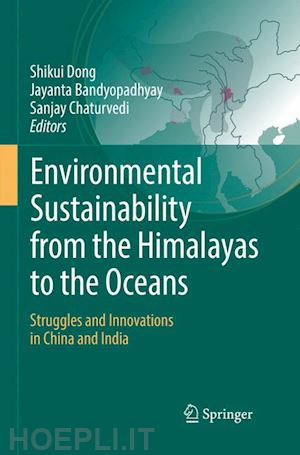

Questo prodotto usufruisce delle SPEDIZIONI GRATIS
selezionando l'opzione Corriere Veloce in fase di ordine.
Pagabile anche con Carta della cultura giovani e del merito, 18App Bonus Cultura e Carta del Docente
The book is written in the backdrop of the environmental impacts of and future requirements from the natural environment for rapid economic growth that has characterized recent economic history of China and India, especially over the past few decades. The environmental impacts of such rapid economic changes have been, more frequently than otherwise, degrading in character. Environmental impacts of economic activities create degraded natural ecosystems by over utilization of nature’s provisioning ecosystem services (from Himalaya to the Ocean), as well, by the use of the natural environment as sink for dumping of unmarketable products or unused inputs of economic activities. Such processes affect wide range of ecosystem processes on which the natural environment including human population depend on.
Critical perspectives cast by various chapters in this book draw attention to the various ways in which space and power interact to produce diverse geographies of sustainability in a globalizing world. They also address the questions such as who decides what kind of a spatial arrangement of political power is needed for sustaining the environment. Who stands to gain (or lose) what, when, where, and why from certain geographical areas being demarcated as ecologically unique, fragile and vulnerable environments? Whose needs and values are being catered to by a given ecosystem service? What is the scope for critical inquiry into the ways in which the environment is imagined, represented and resisted in both geopolitical struggles and everyday life? The book provides insights to both academics from diverse disciplines and policy makers, civil society actors interested in mutual exchange of knowledge between China and India.
Shikui Dong is a full professor at Beijing Normal University, China and an adjunct professor at Cornell University, USA. A Fellow with the India China Institute at The New School, New York(2010-2012) and a Fellow with Asia Scholarship Foundation (2006-2008; 2009-2010), his research focuses on highland ecosystem restoration, highland resource management and sustainable development, and coupled human-natural systems in environmental protection.
Jayanta Bandyopadhyay is an author and expert on environmental policy. He is a former Professor at the Indian Institute of Management in Calcutta and former Visiting Professor at the Jawaharlal Nehru University in New Delhi. He is an adviser to the Water Diplomacy Program at the Tufts University, Medford MA USA.
Sanjay Chaturvedi is Professor of Political Science at Panjab University in Chandigarh, India. He was a Fellow of the India-China Institute (2010-2012) at the New School, New York (USA) and Visiting Senior Research Fellow at the Institute of Southeast Asian Studies (ISEAS), Singapore, from 2010-2012. He is an Associate Fellow of Asia Society, New York and Associate of Indo-Pacific Governance Research Centre at The Adelaide University.











Il sito utilizza cookie ed altri strumenti di tracciamento che raccolgono informazioni dal dispositivo dell’utente. Oltre ai cookie tecnici ed analitici aggregati, strettamente necessari per il funzionamento di questo sito web, previo consenso dell’utente possono essere installati cookie di profilazione e marketing e cookie dei social media. Cliccando su “Accetto tutti i cookie” saranno attivate tutte le categorie di cookie. Per accettare solo deterninate categorie di cookie, cliccare invece su “Impostazioni cookie”. Chiudendo il banner o continuando a navigare saranno installati solo cookie tecnici. Per maggiori dettagli, consultare la Cookie Policy.